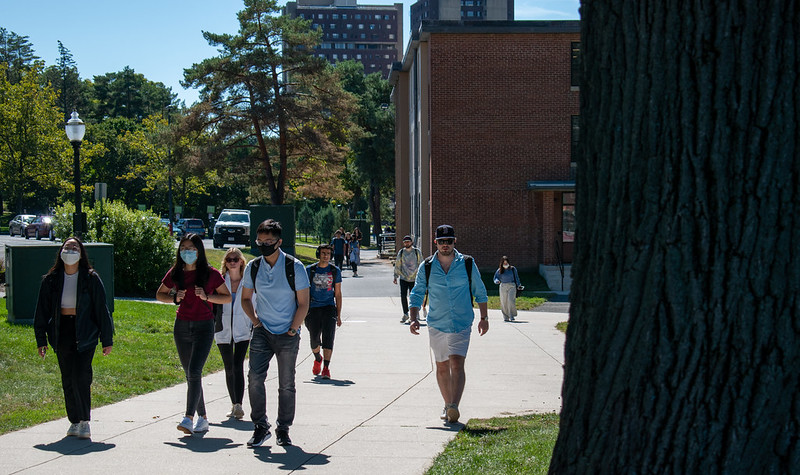As students get settled on campus for the fall 2022 semester at the University of Massachusetts, COVID-19 protocols have been established to ensure the safety of faculty, staff and students. With on-campus vaccination centers and free antigen rapid tests, UMass has made sure to stay on top of the pandemic as the semester continues.
Jeff Hescock, executive director of environmental health and safety and emergency management and co-director of the Public Health Promotion Center, said that the school is closely tracking COVID-19 cases. The University also reinstated the case dashboard on their website.
“If you are looking at the data you can see it went up when the students returned, which we anticipated and it has gone down and it continues to go down,” Hescock said. Recently posted data shows that UMass is currently in the single digits in terms of cases.
“We continue to manage COVID-19 cases and continue to stress individuals to take personal responsibility in terms of if they want to wear a mask or don’t want to wear a mask,” Hescock said.
Zack Steward, senior African-American studies and legal studies double major, is a member of Access UMass. The student group works to make campus more accessible for everyone, regardless of their ability.
“I would say UMass is dealing with COVID-19 in the same way a lot of people are dealing with COVID-19. It may seem like it’s mostly over but it’s not and it’s still affecting a lot of people,” he said.
Hescock noted antigen tests are readily available and continue to be offered in the basement of Campus Center, as well as at University Health Services.
“We are continuing to offer the new bivalent vaccine and I encourage all of our students and faculty and staff to come down to the [Public Health Promotion Center] on Thursdays and Fridays and to check the website for further information,” he said.
Steward says that it is good that the school is working to ensure that students who test positive isolate themselves by not going to class and potentially infecting other people. “Who is that fair to? It’s not fair to you, it’s not fair to me, it’s not fair to anyone,” said Steward.
Hescock says, “Overall, in terms of how we have been managing this fall semester, following the Massachusetts Department of Public Health and CDC guidance, in terms of public health protocols, I think we’re in a really good position this far into the semester.”
Hescock also noted that the students are doing a good job reporting when they test positive because “it’s good transparent information to share with our campus community.”
“We produce a very detailed isolation guide that individuals will receive in their email after testing at UMass. And it goes through how to safely isolate and distance yourself from others,” said Hescock.
Public health teams on campus work within individuals, faculty, staff or students, to determine when they need to isolate if they test positive or may have been exposed, according to Hescock.
Steward suggested that the University reinstate the sick meal policy, where meals are delivered to dorms. This would “…ensure the people who are positive are getting access to food so they don’t starve. From what I’ve heard there’s only grab-and-go options.”
Steward noted that because of grab-and-go’s specific hours and people schedules, students might not be able to access it.
“People can get their friends to get it for them, but they also have to work around their schedules and find the time,” said Steward. It would be helpful if there was the option of “potentially getting food delivered to the front door so you can grab it and go back to your room to eat.”
Christine Ziadeh, freshman music major, said that her COVID-19 experience was stressful since both her roommate and Ziadeh live far from home. “I wore a mask when my roommate was in the room,” Ziadeh said, “But I still worried I would get her sick because we were forced to stay in the same space. I had to unmask while eating and sleeping.”
“Luckily, my roommate did not get sick, but the circumstances were definitely not preferable,” Ziadeh said. Sometimes, her roommate would bring Ziadeh grab-and-go on top of her own busy schedule. She says it was especially difficult because, “grab-and-go closed early and was closed on the weekend.”
“Since I live in Orchard Hill, I wasn’t physically able to make the walk to grab-and-go myself since I did get really sick,” Ziadeh said. She says she started ordering soup on DoorDash and other groceries from Target to make microwaveable meals. “The health center never told me about the sick meals [option] so I never got to make use of them,” she said.
Ziadeh felt that there was more the University could have done to support her or let her know of campus resources. “I got COVID during the very first week of school, so I was very unfamiliar with everything,” she said.
Hescock encourages faculty, staff and students to continue to report their positive tests and to take advantage of the rapid antigen testing. “I strongly encourage everybody to get the bivalent booster shot as well as the flu shot. We are offering both of those at the same time,” Hescock said.
Sarah Yi can be reached at [email protected].


















